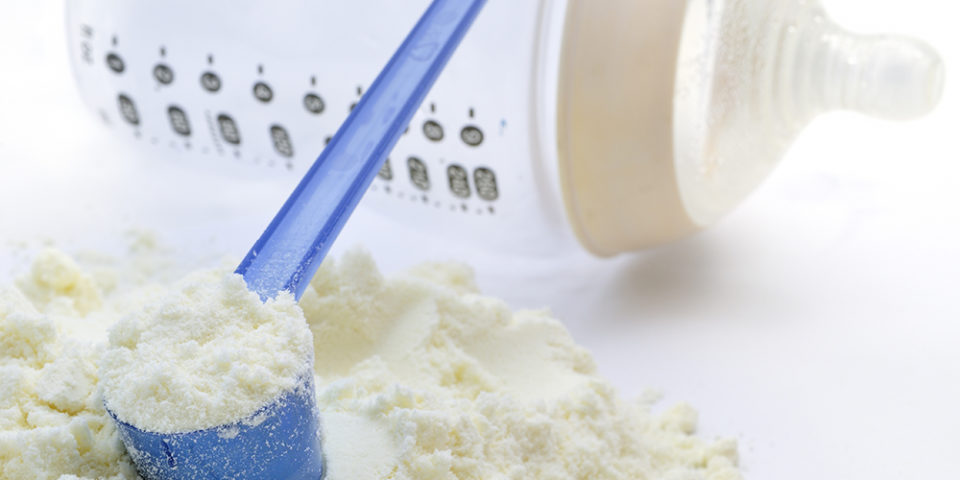What to do during an infant formula shortage
The news has been filled with stories about the recent infant formula shortage, with some stores reporting 40% less stock than usual. Parents of formula-fed infants or those who supplement may wonder how an infant formula shortage happens and what steps parents can take.
Blakely Amati, MD, explained a few key points parents need to know about infant formula shortages and what to do if you can’t find your baby’s usual formula at the store.
What causes infant formula shortages?
“This formula issue currently happening is really a culmination of several things happening all at once,” said Dr. Amati.
The current shortage kicked off when Abbot, one of three companies that manufactures the vast majority of infant formula in the United States, issued a recall and stopped production after traces of bacteria were found within some of its formula products that resulted in the deaths of two infants. Alongside that sudden drop in formula supply, the ongoing supply-chain issues seen since 2020 means new deliveries aren’t as reliable, and formula companies didn’t account for increased demand. With trade regulations heavily limiting amount of formula that can be imported from out of the country, any drop in supply from one of the three American companies results in a huge impact on what products are available.
The Women, Infants, and Children Program (or WIC) that helps to provide qualified families with vouchers that cover the cost of infant formula is facing serious staffing shortages. The program is struggling to enroll families within the first month of an infant’s life.
While the current infant formula shortage is likely soon to resolve, such concerns could reoccur in the future.
What steps are being taken to prevent it from happening again?
There’s no easy fix to ensure it can’t be a problem in the future, but pediatricians, programs like WIC and SNAP and others are working hard to take steps to make it less likely.
“WIC is prioritizing getting infants in to get them enrolled in the program,” said Dr. Amati. “They are trying to see patients in other counties to help speed up the process and also working on offering the ability to utilize substitutions, which has not previously been the case.”
Physicians’ offices are also putting together lists of substitutions families can utilize when their regular formula is not in stock.
What can families do during an infant formula shortage?
“About 70% of babies receive at least some formula in the United States,” said Dr. Amati. “If you are breastfeeding but supplement with formula or are considering supplementing, we do encourage you to breastfeed as much as you can, to keep up your supply for as long as possible.”
Some women who produce more breastmilk than their baby needs may be able to donate to local ‘milk banks’ that help to provide stored breastmilk to families in need. Relactation is also possible for some mothers whose infants are less than three months old or who have only very recently dropped in supply.
If your baby is formula-fed, it is safe to switch between brands of formula if the basic type of formula is the same. For example, if you buy soy-based formula, it is safe to substitute the generic store-brand soy formula, but Dr. Amati would not recommend switching up types of formula, as that can cause stomach upset and other issues.
For those who have infants who receive specialty formula or who have special medical needs, Dr. Amati heavily recommended calling your baby’s physician’s office and work through possible options. In some cases, preemie babies may be given regular infant formula with extra calories, but you should speak with a pediatrician to ensure your baby receives those extra calories in safe ways.
Parents may also be able to use online formula store locators, check smaller or less trafficked stores, or even order formula online and have it delivered directly to their home. Some have discovered formula available in online parent groups or even from others in their neighborhood.
The AAP advises buying no more than a 10-day to 2-week supply of formula to ease shortages.
Is there anything parents should not do in case of a shortage?
Toddler formulas and/or whole cow’s milk is generally not recommended for infants. However, if you absolutely have no other choice, toddler formula or whole cow’s milk is safe for a few days in a pinch for babies older than 6 months of age during the shortage. Be sure to include plenty of iron-containing solid foods (iron fortified cereals, eggs, lentils/beans, meats, green leafy veggies). This approach is not ideal and should not become the routine.
Don’t stop giving formula once an infant is old enough to introduce solids. Solid foods starting at 6 months are more for fun and exploration of different tastes and textures, the majority of calories needed for growth and development still come from an infant’s milk in the first year of life.
“Don’t water down formula to try and make it last longer,” said Dr. Amati. “Formula is made with a specific balance of nutrients, designed to be mixed with a specific amount of water. If that balance is off, it can lead to sickness or even severe problems like seizures.”
Don’t rely on homemade formula. There are plenty of recipes for homemade formulas floating around the internet, but many of those recipes are from decades ago and contain ingredients that are not safe for infants and could result in serious malnutrition.
“We don’t want our parents to feel in crisis or totally helpless,” said Dr. Amati. “If you are concerned about the current shortage or worried about the possibility of shortages in the future, please call your pediatrician’s office and we’ll see what we can do to help you and your family keep your baby happy, healthy, and fed.”
Find the care you need, close to home
Our primary care physicians provide well visits and everyday care when you need it with compassion and expertise.
Find Primary Care Near You

